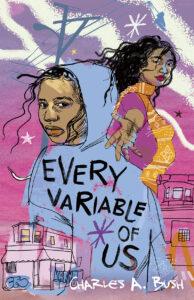
Alexis Duncan is a Black teenage girl from Philadelphia whose incredible basketball skills are her one ticket to receiving a scholarship and getting out of her poverty-stricken neighbourhood. However, after getting injured during a shooting at a high school party and being told she will never play again, her dreams vanish. Aamani Chakrabarti, the new student in school, believes that Alexis has the potential to thrive even outside of an exclusively athletic environment, and pushes her to join her on the high school's STEM team. Alexis agrees (reluctantly) and eventually starts to learn that she has a passion outside of basketball-astronomy. But with the chaos in her personal life constantly making her second-guess if she can actually strive for a better future for herself, and her feelings for Aamani becoming ever more confusing, Alexis must fight to not let her doubts get in her own way.
I read this book back in December of 2021 and still, two and a half years later, I remember so many details of the emotional trainwreck it put me through. I made the unwise decision of reading it on a plane, and not only did I finish it within one sitting, but I also had to find a way to sob silently next to sleeping strangers for the entire second half of the story. There is something about the way that Bush wrote these characters that made me so deeply attached to them right from the beginning. I was incredibly invested in the storyline, the characters' relationship, and especially Alexis's character development. I really appreciate Bush writing a main character that you can root for, while still making her realistic and flawed. Alexis is a product of her environment and has opinions about other people and the world that can be ignorant, bigoted, and uninformed-opinions that happen to also impact her own identity and self-worth. Those opinions are challenged by the text, specifically through Aamani's character, in a way that is both subtle and poignant. I think authors sometimes struggle to write effective redemption arcs for their characters, which made it that much more satisfying to watch Alexis' redemption unfold in a carefully crafted way.
The other great thing about this book is that it absolutely is made for its target audience. Bush wrote it for a young adult reader, and you can tell that he made sure that the characters, their struggles, their anxieties, their fears, and their friendships would feel relatable to that audience, without underestimating what they could handle in a story or what they would want to read about. I think it shows just how much respect Bush has for his young readers to know that they would be able to not just handle heavy themes such as internalized misogyny and homophobia, racism, poverty, violence, and drug abuse, but concretely understand, relate to, and analyse these themes. I love when authors give their young audience the benefit of the doubt and don't try to over simplify or sugarcoat serious storylines. It allows teenage readers to access literature that is more than just informative, but also liberating and self-reflecting.
I've recommended this book a lot over the years, in many different circumstances. To readers looking for: underrated novels; heart-breaking storylines; books that accurately center characters of colour; sapphic books that aren't romance novels but are nonetheless romantic; books that heal the part of you that struggled to accept your queerness when you were younger; stories that discuss the intersection of race and queerness; novels that make you cry sad tears; novels that make you cry happy tears; books that will put you in a reading slump; books that will get you out of a reading slump. There are dozens of reasons to pick up this book and exactly zero reasons not to. It remains, to this day, one of my most memorable reading experiences and one of my favourite go-to recommendations.
Representation: Black bisexual disabled main character, Indian-American lesbian love interest
Content warnings: gun violence, gore, drug abuse, homophobia, islamophobia, biphobia, death, abuse, racism, transphobia

